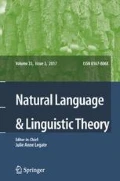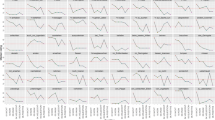Abstract
This paper presents an analysis of the ordering of speaker-oriented adverbs (SpOAs) with respect to each other and negation, arguing that SpOAs are positive polarity items, and therefore normally cannot follow negation. The adverbs represent a speaker’s subjective commitment to the truth of the proposition represented by the adverb, which is incompatible with the falsity of the same proposition required by negation. This also accounts for the usual unacceptability of SpOAs in other contexts, such as questions and conditionals. The analysis extends to other contexts where SpOAs are acceptable, such as negative questions and negative counterfactual conditionals, in such a way as to contribute support for Giannakidou’s (non)veridical theory of polarity over “strengthening” theories based on scalar implicatures. It is also shown that SpOAs’ underlying semantic property of being subjective also helps predict their linear order with respect to each other.
Similar content being viewed by others
References
Aikhenvald, Alexandra. 2004. Evidentiality. Cambridge: Cambridge University Press.
Alexiadou, Artemis. 1997. Adverb placement. Amsterdam: John Benjamins.
Baker, Carl L. 1970. Double negatives. Linguistic Inquiry 1: 169–186.
Bellert, Irena. 1977. On semantic and distributional properties of sentential adverbs. Linguistic Inquiry 8: 337–350.
Bobaljik, Jonathan. 2000. Adverbs: the hierarchy paradox. GLOT International 4(9/10): 27–28.
Bybee, Joan, and Fleischmann. 1995. Modality in grammar and discourse. Amsterdam: John Benjamins.
Carston, Robyn. 1996. Metalinguistic negation and echoic use. Journal of Pragmatics 25: 309–330.
Chierchia, Gennaro. 2004. Scalar implicatures, polarity phenomena, and the syntax/pragmatics interface. In Structures and beyond: the cartography of syntactic structures, ed. Adriana Belleti. Oxford: Oxford University Press.
Chierchia, Gennaro. 2006. Broaden your views: implicatures of domain widening and the “Logicality” of language. Linguistic Inquiry 37(4): 535–590.
Cinque, Guglielmo. 1999. Adverbs and functional heads: a cross-linguistic perspective. Oxford: Oxford University Press.
Cinque, Gugielmo. 2004. Issues in adverbial syntax. Lingua 114: 683–710.
Cormack, Annabel, and Neil Smith. 2002. Modals and negation in English. In Modality and its interaction with the verbal system, eds. Sjef Barbiers, Frits Beukema, and Wim van der Wurff. Amsterdam: John Benjamins.
Croft, William, and D. Alan Cruse. 2004. Cognitive linguistics. Cambridge: Cambridge University Press.
deHaan, Ferdinand. 1999. Evidentiality and epistemic modality: setting boundaries. Southwest Journal of Linguistics 18: 83–101.
Delfitto, Denis. 2000. Adverbs and the syntax/semantics interface. Rivista di Linguistica 12: 13–53.
Drubig, Hans. 2001. On the syntactic form of epistemic modality. Unpublished manuscript, Tubingen: University of Tubingen.
Ernst, Thomas. 1984. Towards an integrated theory of adverb position in English. Bloomington: IULC.
Ernst, Thomas. 1991. On the scope principle. Linguistic Inquiry 22(4): 750–756.
Ernst, Thomas. 1992. The phrase structure of English negation. The Linguistic Review 9(2): 109–144.
Ernst, Thomas. 2002. The syntax of adjuncts. Cambridge: Cambridge University Press.
Ernst, Thomas. 2007. On the role of semantics in a theory of adverb syntax. Lingua 117: 1008–1033.
Fauconnier, Gilles. 1975. Polarity and the scale principle. In Proceedings of the 11th meeting of the Chicago Linguistics Society, eds. R.E. Grossman, L.J. San, and T.J. Vance. Chicago.
Foley, William, and Robert Van Valin. 1984. Functional syntax and universal grammar. Cambridge: Cambridge University Press.
Frey, Werner, and Karin Pittner. 1998. Zur Positionierung der Adverbiale im deutschen Mittelfeld (On the positioning of adverbials in the German middle field). Linguistische Berichte 176: 489–534.
Giannakidou, Anastasia. 1999. Affective dependencies. Linguistics and Philosophy 22: 367–421.
Giannakidou, Anastasia. 2001. Varieties of polarity items and the (non)veridicality hypothesis. In Perspectives on negation and polarity items, eds. Jack Hoeksema, Hotze Rullman, Victor Sanchez-Valencia, and Ton van der Wouden. Amsterdam: John Benjamins.
Giannakidou, Anastasia. 2006. Only, emotive factive verbs, and the dual nature of polarity dependency. Language 82: 575–603.
Giannakidou, Anastasia. 2007. The landscape of EVEN. Natural Language & Linguistic Theory 25: 39–81.
Greenbaum, Sidney. 1969. Studies in English adverbial usage. Coral Gables: University of Miami Press.
Groenendijk, Jeroen, and Martin. Stokhof. 1984. Studies on the semantics of questions and the pragmatics of answers. Doctoral dissertation. Amsterdam: University of Amsterdam.
Haider, Hubert. 2004. Pre- and postverbal adverbials in OV and VO. Lingua 114: 779–807.
Haumann, Dagmar. 2007. Adverb licensing and clause structure in English. Amsterdam: Benjamins.
Hengeveld, Kees. 1988. Illocution, mood, and modality in a functional grammar of Spanish. Journal of Semantics 6: 227–269.
Horn, Lawrence. 1989. A natural history of negation. Chicago: University of Chicago Press.
Hoye, Leo. 1997. Adverbs and modality in English. Harlow: Addison-Wesley, Longman.
Huddleston, Rodney, and Geoffrey Pullum. 2002. Cambridge grammar of the English language. Cambridge: Cambridge University Press.
Iwata, Seizi. 1998. Some extensions of the echoic analysis of metalinguistic negation. Lingua 105: 49–65.
Jakobson, Roman. 1971. Shifters, verbal categories, and the Russian verb. In Selected writings, ed. Roman Jakobson. The Hague: Mouton.
Kadmon, Nirit, and Fred Landman. 1993. Any. Linguistics and Philosophy 16: 353–422.
Kamp, Hans, and Uwe Reyle. 1993. From discourse to logic. Dordrecht: Kluwer.
Karttunnen, Lauri. 1972. Possible and must. In Syntax and semantics, ed. John F. Kimball. New York: Seminar Press.
Karttunnen, Lauri. 1977. The syntax and semantics of questions. Linguistics and Philosophy 1: 3–44.
Kennedy, Christopher. 1999. Projecting the adjective. New York: Garland.
Kiefer, Ferenc. 1984. Focus and modality. Groninger Arbeiten zur Germanistischen Linguistik 24: 55–81.
Kratzer, Angelika. 1991. Modality. In Semantics: an international handbook of contemporary research, eds. Arnim von Stechow and Dieter Wunderlich. Berlin: Mouton de Gruyter.
Kratzer, Angelika. 2002. The notional category of modality. In Formal semantics: the essential readings, eds. Paul Portner and Barbara Partee. Oxford: Blackwell.
Krifka, Manfred. 1995. The semantics and pragmatics of polarity items. Linguistic Analysis 25: 209–257.
Ladusaw, William. 1979. Polarity sensitivity as inherent scope relations. PhD dissertation. Austin: University of Texas.
Ladusaw, William. 1996. Negation and polarity items. In The handbook of contemporary semantic theory, ed. Shalom Lappin. Oxford: Blackwell.
Langacker, Ronald. 1991. Concept, image, and symbol: the cognitive basis of grammar. Berlin: Mouton de Gruyter.
Langacker, Ronald. 1999. Grammar and conceptualization. Berlin: Mouton de Gruyter.
Lewis, David. 1973. Counterfactuals. Cambridge: Harvard University Press.
Linebarger, Marcia. 1980. The grammar of negative polarity. PhD dissertation, Cambridge: MIT.
Lyons, John. 1977. Semantics, Vol. 2. Cambridge: Cambridge University Press.
Nilsen, Øystein. 2004. Domains for adverbs. Lingua 114(6): 809–847.
Nuyts, Jan. 2001a. Epistemic modality, language, and conceptualization. Amsterdam: John Benjamins.
Nuyts, Jan. 2001b. Subjectivity as an evidential dimension in epistemic modal expressions. Journal of Pragmatics 33: 383–400.
Palmer, F.R. 2001. Mood and modality, 2nd edn. Cambridge: Cambridge University Press.
Papafragou, Anna. 2000. Modality: issues in the semantic-pragmatics interface. Amsterdam: Elsevier.
Papafragou, Anna. 2006. Epistemic modality and truth conditions. Lingua 116: 1688–1702.
Quirk, Randolph, Sydney Greenbaum, Geoffrey Leech, and Jan Svartvik. 1972. A grammar of contemporary English. London: Longman.
Ramat, Paolo, and Davide Ricca. 1998. Sentence adverbs in the languages of Europe. In Adverbial constructions in the languages of Europe, ed. Johan van der Auwera. Berlin: Mouton de Gruyter.
Rizzi, Luigi. 1997. The fine structure of the left periphery. In Elements of grammar, ed. Liliane Haegeman. Dordrecht: Kluwer.
Romero, Maribel, and Chung-hye Han. 2004. On negative yes/no questions. Linguistics and Philosophy 27(5): 609–658.
Rooth, Mats. 1985. Association with focus. PhD dissertation. Amherst: University of Massachusetts.
Sells, Peter. 1987. Aspects of logophoricity. Linguistic Inquiry 18: 445–479.
Speas, Margaret. 2004. Evidential paradigms, world variables, and person agreement features. Italian Journal of Linguistics 16(4).
Speas, Peggy, and Carol Tenny. 2003. Configurational properties of point of view roles. In Asymmetry in grammar. Amsterdam: John Benjamins.
Stalnaker, Robert. 1968. A theory of conditionals. In Studies in logical theory, ed. Nicholas Rescher. Oxford: Basil Blackwell.
Stirling, Lesley. 1993. Switch-reference and discourse representation. Cambridge: Cambridge University Press.
Tenny, Carol. 2000. Core events and adverbial modification. In Events as grammatical objects, eds. Carol Tenny and James Pustejovsky. Stanford: CSLI.
Thompson, Geoff, and Susan Hunston. 2000. Evaluation: an introduction. In Evaluation in text, eds. Susan Hunston and Geoffrey Thompson. Oxford: Oxford University Press.
van der Wouden, Ton. 1997. Negative contexts: collocation, polarity, and multiple negation. London: Routledge.
van Rooy, Robert. 2003. Negative polarity items in questions: strength as relevance. Journal of Semantics 20: 239–273.
von Stechow, Arnim. 2006. Times as degrees. Unpublished manuscript. University of Tuebingen.
Wright, Von. 1951. Deontic logic. Mind 60: 1–15.
Zwarts, Frans. 1996. Three types of polarity. In Plurality and quantification, eds. Fritz Hamm and Erhard Hinrichs, 177–238. Dordrecht: Kluwer.
Author information
Authors and Affiliations
Corresponding author
Rights and permissions
About this article
Cite this article
Ernst, T. Speaker-oriented adverbs. Nat Lang Linguist Theory 27, 497–544 (2009). https://doi.org/10.1007/s11049-009-9069-1
Received:
Accepted:
Published:
Issue Date:
DOI: https://doi.org/10.1007/s11049-009-9069-1




